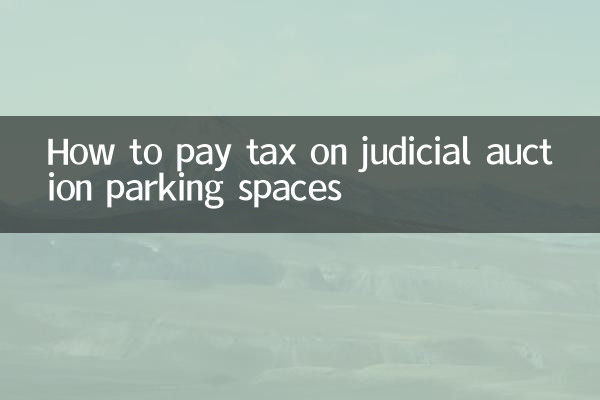How to pay tax on judicial auction parking spaces
In recent years, with the popularity of judicial auctions, more and more home buyers have purchased parking spaces through judicial auction channels. However, the issue of taxes and fees for judicial auction parking spaces confuses many people. This article will combine the hot topics and hot content on the Internet in the past 10 days, analyze the tax issues of judicial auction parking spaces in detail, and provide structured data to help you better understand the relevant tax policies.
1. Basic tax and fee composition of judicial auction parking spaces

Taxes on judicial auction parking spaces mainly include deed tax, value-added tax, personal income tax, stamp duty, etc. Specific tax standards vary by region and policy. Here is a detailed description of common taxes and fees:
| tax type | tax rate | taxpayer | Remarks |
|---|---|---|---|
| Deed tax | 3%-5% | buyer | Calculated based on appraisal price or transaction price |
| value added tax | 5% | seller | If the seller is an individual, the tax is usually exempted |
| personal income tax | 20% | seller | Calculated based on value added part |
| stamp duty | 0.05% | buyers and sellers | Each party bears half |
2. Tax payment process for judicial auction parking spaces
The tax payment process for judicial auction parking spaces is usually divided into the following steps:
1.Confirm tax amount: After the bidding is successful, the court or auction agency will provide a "Transaction Confirmation Letter", which will indicate the estimated price or transaction price of the parking space. The buyer is required to calculate the tax payable based on this price.
2.Pay deed tax: The buyer needs to bring the "Transaction Confirmation Letter", identity certificate and other materials to the local tax department to pay the deed tax.
3.Go through transfer procedures: After paying the tax, the buyer needs to go to the real estate registration center to handle the parking space transfer procedures with the tax payment certificate and other relevant materials.
4.Other taxes: If the seller is an individual, the court usually withholds and pays personal income tax; if the seller is an enterprise, the buyer needs to assist the seller in paying VAT and other taxes.
3. Preferential tax and fee policies for judicial auction parking spaces
In recent years, some regions have introduced preferential tax and fee policies for judicial auction parking spaces to reduce the burden on buyers. The following are preferential policies for some areas:
| area | Preferential policies | Applicable conditions |
|---|---|---|
| Beijing | Deed tax reduced by half | Buying a parking space for the first time |
| Shanghai | stamp duty exemption | Individual purchase of parking space |
| Guangzhou City | personal income tax relief | The parking space is the only parking space for the family |
4. Precautions for judicial auction of parking spaces
1.Tax calculation basis: Taxes and fees for judicial auction parking spaces are usually calculated based on the higher of the assessed price or transaction price. Buyers need to understand local policies in advance.
2.tax sharing: Some auction announcements will specify that taxes and fees are borne by the buyer or seller. Buyers need to read the auction announcements carefully to avoid disputes.
3.tax consulting: Since the tax policy for judicial auction parking spaces is relatively complex, it is recommended that buyers consult professional tax personnel before bidding to ensure an accurate understanding of the tax burden.
5. Summary
The tax issue of judicial auction parking spaces involves multiple tax types and complex policies. Buyers need to understand the relevant tax composition, tax payment process and preferential policies in advance. Through the structured data and analysis of this article, I hope it can help you better deal with the tax issues of judicial auction parking spaces and successfully complete the transaction.

check the details

check the details